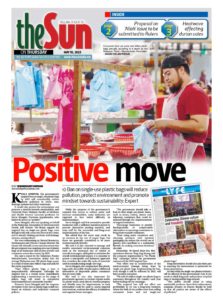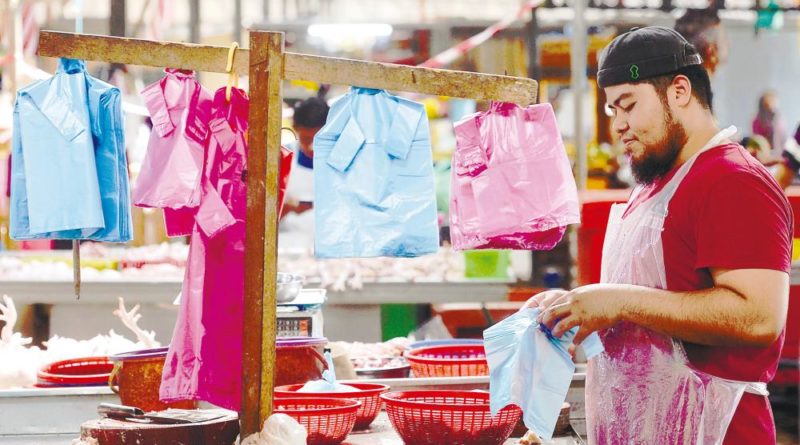HEADLINE | WASTE MGMT: Plastic bag ban hailed as ‘positive move’
.

KUALA LUMPUR: The government’s targeted ban on single-use plastic bags by 2025 will considerably reduce plastic pollution in rivers, seas, drainage systems and other waterways.
It would also protect the environment and promote a mindset towards sustainability, said Universiti Putra Malaysia Faculty of Medicine and Health Science associate professor Dr Sarva Mangala Praveena Appalanaidu, who hailed the move as “positive”.
Sarva Mangala, who was speaking on behalf of the Malaysian Association of Environmental Health, told theSun: “We firmly support the targeted ban on single-use plastic bags, even though it will only come into force in two years, as it is already choking our rivers and drainage systems, among others.”
She was commenting on Natural Resources, Environment and Climate Change Minister Nik Nazmi Nik Ahmad’s recent announcement that the government was targeting zero use of plastic bags at all businesses and sectors of trade and commerce across the country by 2025.
She said a report by the Malaysian Plastics Manufacturers Association stated that the average Malaysian uses 300 plastic bags a year, or a total of some nine billion bags annually for the entire population.
“Nine billion plastic bags a year is unquestionably substantial. Although the targeted ban is a crucial move, immediately implementing a moratorium on the usage of plastic bags will result in substantial environmental and community benefits.”
However, Sarva Mangala said the response of retailers to the ban on plastic bags could vary, based on industry and individual company policies.
While the purpose of the government’s targeted ban serves to reduce waste and increase sustainability, some industries are expected to face initial difficulty in implementing it.
Sarva Mangala said it is essential to provide businesses with a sufficient transition period to procure alternative packing material, and train staff for the successful and long-term implementation of the ban.
She added that the move may result in an increase in the use of paper bags, but those are generally considered to be more environmentally friendly.
She said it is also essential to manage and resolve associated environmental concerns such as the increased use of timber to manufacture paper, adding that to minimise the overall environmental impact, it is essential to pursue a sustainable and balanced approach that considers the entire life cycle of materials used in manufacturing single-use bags.
Sarva Mangala also emphasised that plastic bags aside, the public should explore additional alternatives to disposable plastic containers that are used daily.
She said it was also important for government agencies to conduct regular audits on plastic waste, track data to monitor progress and identify areas for improvement, as such information could be used to assess targeted interventions, evaluate the efficacy of initiatives and organise future strategies.
“The government should take a look at other single-use plastic items, such as straws, cutlery, stirrers and takeaway containers that could be reduced through the implementation of targeted initiatives.
“Encourage businesses to provide biodegradable or compostable alternatives or encourage consumers to bring their reusable containers.
“Even using water containers and choosing products with minimal packaging can reduce the overall use of plastics and contribute to a sustainable lifestyle via making conscious decisions,” she said.
Meanwhile, 99 Speed Mart Sdn Bhd operations director Yong Eng Kwang said the company implemented a “No Plastic Bag” campaign before the government announced the 2025 targeted ban.
“Our effort was in consideration of the environmental damage being done by single-use plastic bags. Implementing the ban, even though it will be enforced by 2025, will have positive outcomes.
“We sold 42 million single-use plastic bags to customers throughout the country each year before kicking off our campaign.
“The targeted ban will not affect our profitability as we run a long-term business, where the bulk of our profits come from selling consumer items and not single-use plastic bags.”
Yong said retailers should also play their part in ensuring the environment is preserved for future generations.
He said while the single-use plastics industry will be affected by the government’s ban, it too needs to think long term and produce recycled bags or biodegradable bags instead.
“The public should adapt to using sustainable products. Apart from enforcement, seminars, lectures or courses should be held so that all parties are aware of the effects of pollution.”
 Ads by: Memento Maxima Digital Marketing
Ads by: Memento Maxima Digital Marketing
@[email protected]
SPACE RESERVE FOR ADVERTISTMENT


 Memento Maxima Digital Marketing
Memento Maxima Digital Marketing






